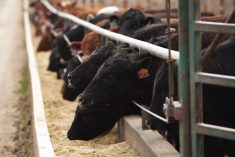A few more Canadians eat beef now than they did in 2022 according to a survey from the Canadian Roundtable of Sustainable Beef (CRSB).
That’s what CRSB executive director Monica Hadarits had to say at the Western Canada Conference on Soil Health and Grazing held this week in Edmonton.
In July of 2024, the CRSB’s consumer research found a positive outlook on the industry from consumers. They surveyed around 2000 Canadians asking for their thoughts on the industry and about the National Beef Sustainability Assessment, which CRSB put out in January of 2024.
They found that 92 per cent of Canadians eat beef, up two per cent from 2022. They also found that 55 per cent of people say the industry’s sustainability is excellent or good, 28 per cent called it acceptable, 11 per cent were unsure and six per cent say it is poor or very poor. That number has gone down four per cent from 2022.
Thirty-four per cent of respondents said they have a good idea of what makes beef sustainable, 46 per cent said they don’t know much about beef sustainabilty but are okay with that, and 20 per cent said they don’t know and would like to learn more

When asked what they most want to learn about the beef industry, 69 per cent said they wanted to know more about animal health and welfare, 57 per cent wanted to know about the safe production of food and 49 per cent said they wanted to learn how beef production contributes to maintaining or enhancing wildlife habitat and biodiversity, among other things.
Hadarits said this data will help them continue to teach consumers about the industry — especially about sustainability.
“The way that we use this information at CRSB is to share it with folks like yourselves, but also to help us in our communications and marketing strategies,” she said. “When we’re working through the next year, really focusing on those that say it’s acceptable because they’re kind of on the fence, and then those that are unsure.”
Read Also

JBS profit falls amid still-challenging US market environment
JBS, the world’s largest meat company, reported a net profit fall in the third quarter in spite of a rise in global net sales amid a still-challenging beef market environment in the U.S., according to an earnings statement on Thursday.
She said they also want to spend more time connecting with producers.
“We have heard pretty loud and clear the last year that we need to be in front of producers more, and so we’re working through strategies on that. We’re a very small staff … but you are the foundation of our industry, so that’s something that we’ve committed to working on and doing better on.”















